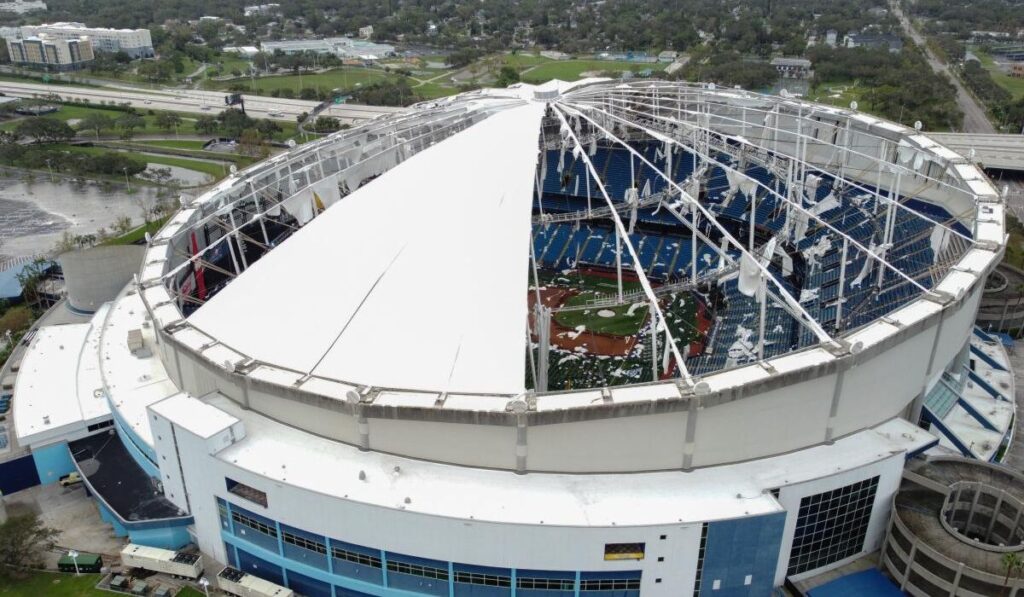The Impact of Hurricane Milton
Timeline of Events
As Hurricane Milton approached the Florida coast, local authorities and emergency services sprang into action. Tropicana Field, known for its distinctive dome, was initially designated as a staging area for emergency responders. However, the situation took a dramatic turn as the hurricane intensified beyond expectations. On the evening of October 9, as Milton’s eye wall passed over St. Petersburg, winds exceeding 150 mph battered the stadium. Eyewitnesses reported hearing the horrifying sound of metal twisting and fiberglass shattering as the storm unleashed its fury on the dome.
Damage Assessment
The morning after the hurricane revealed the extent of the devastation. Drone footage captured by local news outlets showed large sections of Tropicana Field’s roof completely torn away, leaving the interior exposed to the elements. The iconic white dome, once a symbol of the Rays’ home field advantage, now lay in tatters. St. Petersburg Fire Rescue confirmed that while the damage to the structure was severe, there were fortunately no injuries reported. This was largely due to the timely evacuation of emergency personnel who had been using the stadium as a base of operations.
Tropicana Field’s Role in Emergency Response
Shelter for First Responders
Before Hurricane Milton’s landfall, Tropicana Field played a crucial role in the region’s emergency preparedness. The stadium was transformed into a shelter capable of housing thousands of first responders mobilized from across the state and country. This strategic decision underscored the importance of large, sturdy structures in disaster response planning.
Community Support Efforts
In the wake of the disaster, the Tampa Bay Rays organization has stepped up to support the community. The team has announced plans to establish a Hurricane Milton relief fund, with players and staff volunteering in local cleanup efforts. This rapid response highlights the deep connection between the Rays and their home city.
Future of Tropicana Field
Repair and Recovery Plans
As the dust settles, attention turns to the future of Tropicana Field. Engineers and structural experts have begun assessing the damage to determine the feasibility and cost of repairs. Early estimates suggest that the renovation process could take several months to a year, depending on the extent of structural damage beyond the visible roof destruction. The Tampa Bay Rays, in conjunction with city officials, have committed to rebuilding. Team owner Stuart Sternberg stated, “Tropicana Field is more than just a baseball stadium; it’s a cornerstone of our community. We will rebuild, and we will come back stronger.”
Long-term Implications for the Tampa Bay Rays
The destruction of Tropicana Field poses significant challenges for the Tampa Bay Rays. The team will likely need to find an alternative venue for home games during the repair process. Options being considered include sharing facilities with other Florida-based MLB teams or temporarily relocating to a minor league stadium in the region. This situation may also reignite discussions about the long-term future of the Rays in St. Petersburg. Some analysts speculate that this could accelerate plans for a new stadium, while others see it as an opportunity to modernize Tropicana Field for the future.
Conclusion
The devastation wrought by Hurricane Milton on Tropicana Field serves as a stark reminder of nature’s power and the importance of community resilience. As St. Petersburg begins the long process of recovery, the spirit of the community shines through. The Tampa Bay Rays, once just a baseball team, have become a symbol of hope and perseverance in the face of adversity. While the road to recovery will be challenging, the united response from local authorities, the Rays organization, and the community at large demonstrates the strength that will see Tropicana Field rise again. As rebuilding efforts commence, the focus remains not just on restoring a stadium, but on healing and strengthening an entire community.

